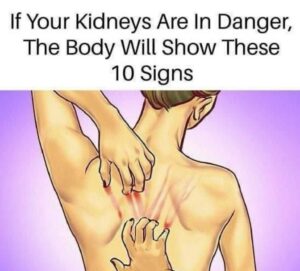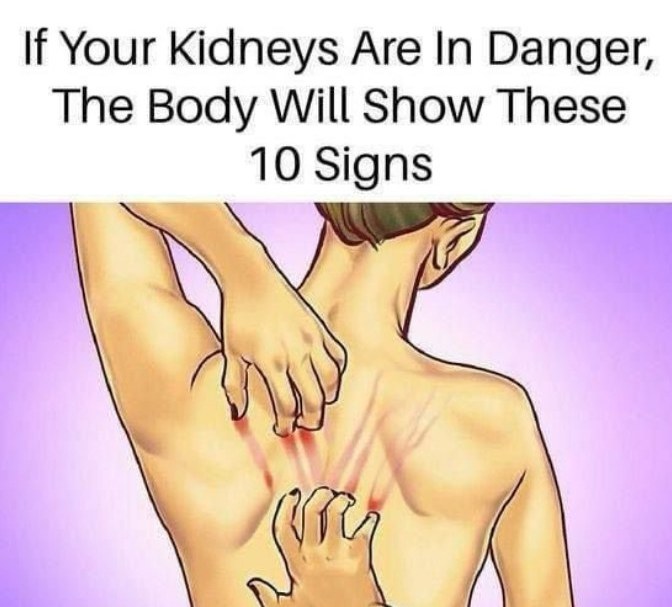10 Early Signs of Kidney Disease You Shouldn’t Ignore – Key Symptoms & Prevention Tips
Kidney disease is a silent health condition that often progresses unnoticed until it reaches an advanced stage. Your kidneys play a vital role in filtering toxins, balancing fluids, and regulating essential minerals in your body. However, when they begin to fail, the symptoms may be subtle at first.
Recognizing the early warning signs of kidney disease can help you seek timely medical attention, preventing further complications and even kidney failure. In this article, we’ll explore 10 key symptoms that could indicate kidney problems and why early detection is crucial.

Why Early Detection Matters
Kidney disease can take years to develop, and in many cases, symptoms don’t appear until the condition is severe. However, early detection allows for better management through lifestyle changes, medications, and treatments that can slow down the progression of kidney damage.
If left untreated, kidney disease can lead to life-threatening complications, including kidney failure, heart disease, and high blood pressure. That’s why knowing the warning signs and taking action early is essential for maintaining your health.
10 Early Signs of Kidney Disease
1. Frequent Urination (Especially at Night)
One of the first warning signs of kidney disease is increased urination, particularly at night (nocturia). The kidneys regulate fluid balance and remove waste through urine. When they start failing, you may notice yourself waking up multiple times to urinate.
🔹 What to Watch For:
✔️ Frequent trips to the bathroom, especially at night
✔️ Changes in urine volume (more or less than usual)
✔️ Strong, persistent urge to urinate
2. Swelling in Feet, Ankles, or Legs
When the kidneys fail to remove excess sodium and fluids from the body, fluid retention can cause swelling, particularly in the lower extremities.
🔹 What to Watch For:
✔️ Puffiness in feet, ankles, or legs
✔️ Shoes or socks feeling tighter than usual
✔️ Swelling that worsens as the day progresses
3. Persistent Fatigue & Weakness
Healthy kidneys remove waste from your blood. When they don’t function properly, toxins build up, leading to chronic fatigue and weakness. Additionally, kidney disease can cause anemia, which contributes to extreme tiredness.
🔹 What to Watch For:
✔️ Constant fatigue despite adequate sleep
✔️ Feeling weak or drained
✔️ Difficulty concentrating
4. Blood in Urine (Hematuria)
Seeing blood in your urine can be a sign of kidney damage, infection, kidney stones, or even more serious conditions.
🔹 What to Watch For:
✔️ Pink, red, or brown-colored urine
✔️ Blood clots in the urine
✔️ Pain or discomfort while urinating
🚨 Seek medical attention immediately if you notice this symptom!
5. Foamy or Frothy Urine
Excess protein in the urine (proteinuria) is a sign of kidney dysfunction. When protein leaks into urine, it creates a foamy or frothy appearance.
🔹 What to Watch For:
✔️ Bubbles or foam in urine (similar to beer or scrambled eggs)
✔️ Urine that looks different from usual and persists over time
6. Shortness of Breath
Kidney disease can cause fluid buildup in the lungs, making it difficult to breathe. It can also lead to anemia, reducing oxygen levels in the blood.
🔹 What to Watch For:
✔️ Difficulty breathing, especially when lying down
✔️ Feeling short of breath with minimal activity
✔️ Persistent coughing
7. Nausea & Vomiting
As kidney function declines, toxins accumulate in the body, causing nausea and vomiting. These symptoms can also contribute to loss of appetite and weight loss.
🔹 What to Watch For:
✔️ Unexplained nausea, especially in the morning
✔️ Vomiting without a clear cause
✔️ Reduced interest in food
8. Loss of Appetite & Unexplained Weight Loss
A buildup of toxins can reduce hunger and lead to unintentional weight loss. The body may also struggle to absorb nutrients, further affecting weight and overall health.
🔹 What to Watch For:
✔️ Feeling full quickly
✔️ Losing weight without changes in diet or exercise
✔️ General loss of interest in food
9. Itchy Skin & Dryness
When kidney function declines, waste and toxins accumulate, leading to skin irritation. This can also be a sign of mineral imbalances, such as high phosphorus levels.
🔹 What to Watch For:
✔️ Persistent itching that doesn’t go away
✔️ Dry, flaky, or irritated skin
✔️ Skin rashes with no known cause
10. High Blood Pressure (Hypertension)
Kidneys play a role in regulating blood pressure. When they fail, blood pressure can rise uncontrollably, creating a cycle that further damages the kidneys.
🔹 What to Watch For:
✔️ Persistent high blood pressure
✔️ Headaches, dizziness, or vision problems
✔️ Difficulty controlling blood pressure even with medication
How to Protect Your Kidneys & Prevent Kidney Disease
Taking care of your kidney health is crucial for overall well-being. If you experience any of the above symptoms, consult a healthcare professional for proper evaluation. Early detection and intervention can help prevent kidney failure and improve your quality of life.
Kidney Health Tips:
✔️ Stay hydrated – drink enough water daily
✔️ Maintain a balanced diet rich in fruits, vegetables, and lean protein
✔️ Reduce salt intake to prevent fluid retention and high blood pressure
✔️ Exercise regularly to improve circulation and overall health
✔️ Monitor blood sugar levels (especially if you have diabetes)
✔️ Limit alcohol and avoid smoking
✔️ Get regular check-ups if you have a family history of kidney disease
When to See a Doctor
🚨 If you experience multiple symptoms from this list, don’t ignore them! Early detection of kidney disease can prevent irreversible damage.
👉 Schedule a check-up if you notice:
✅ Sudden changes in urination patterns
✅ Persistent fatigue or swelling
✅ Blood or foam in urine
✅ High blood pressure that’s difficult to manage
Your kidneys are essential for your health—listen to the warning signs and take action to protect them! 💙💪



